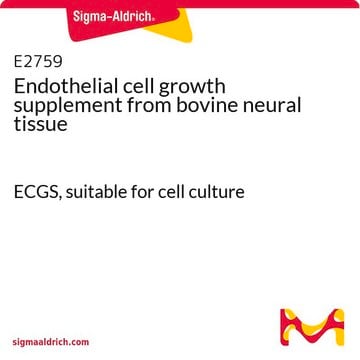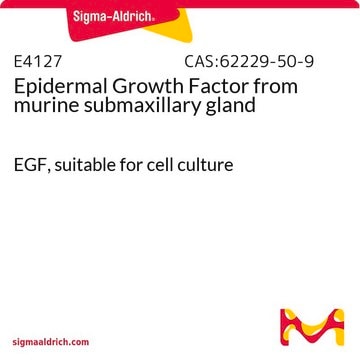E0760
Endothelial cell growth supplement from bovine pituitary
Bioreagent, powder, suitable for cell culture
Synonym(s):
ECGS, Endothelial Mitogen
About This Item
Recommended Products
product name
Endothelial cell growth supplement from bovine pituitary, ECGS, suitable for cell culture, BioReagent
biological source
bovine pituitary glands
Quality Level
product line
BioReagent
form
powder
potency
2-300 μg/mL ED50/EC50
quality
endotoxin tested
packaging
pkg of 15 mg
storage condition
avoid repeated freeze/thaw cycles
technique(s)
cell culture | mammalian: suitable
impurities
≤20 EU/vial (LAL test)
color
brown to tan
solubility
water: soluble to hazy, red to red-brown (1 vial reconstituted with 1 ml 0.85% NaCl)
storage temp.
2-8°C
General description
Application
- as a component in Roswell park memorial institute (RPMI) 1640 medium for endothelial cell culture
- as a supplement in medium 199 for endothelial cell culture
- as a supplement in Dulbecco′s modified eagle medium (DMEM):Ham′s F-12
- as a supplement in Iscove′s modified Dulbecco′s medium (IMDM) for human umbilical vein endothelial cells (HUVEC) culture
Biochem/physiol Actions
Signal Word
Warning
Hazard Statements
Precautionary Statements
Hazard Classifications
Repr. 2
Storage Class Code
10 - Combustible liquids
WGK
WGK 3
Flash Point(F)
Not applicable
Flash Point(C)
Not applicable
Certificates of Analysis (COA)
Search for Certificates of Analysis (COA) by entering the products Lot/Batch Number. Lot and Batch Numbers can be found on a product’s label following the words ‘Lot’ or ‘Batch’.
Already Own This Product?
Find documentation for the products that you have recently purchased in the Document Library.
Customers Also Viewed
Our team of scientists has experience in all areas of research including Life Science, Material Science, Chemical Synthesis, Chromatography, Analytical and many others.
Contact Technical Service







